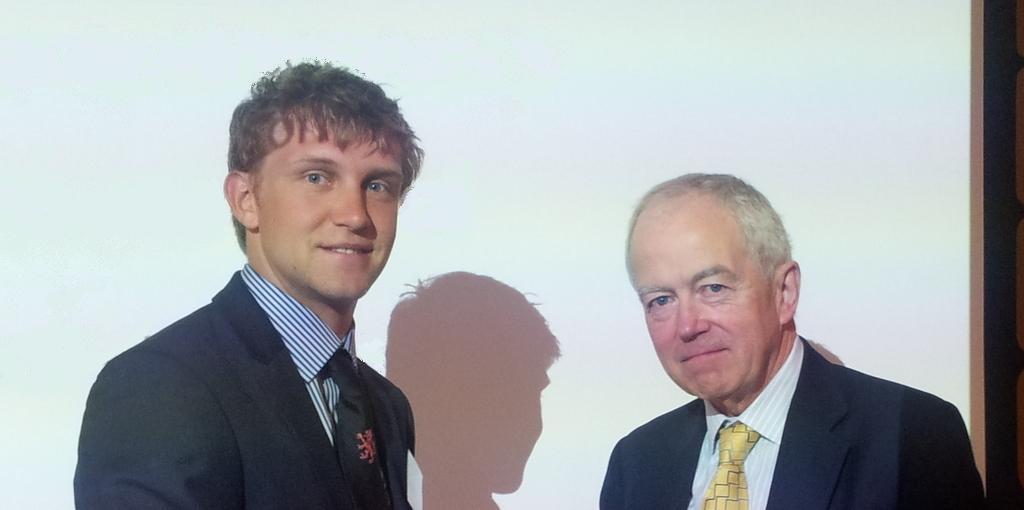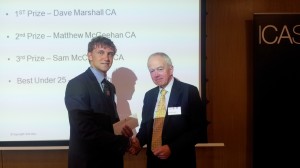
July 3, 2012, by ICCSR
The role of accountants in measuring environmental sustainability
The Role of Accountants in measuring environmental sustainability: A report from the ICAS sustainability essay competition awards 2012
This year the Institute of Chartered Accountants of Scotland (ICAS) launched a sustainability essay competition, sponsored by Grant Thornton, with the aim of increasing awareness of environmental sustainability and the role that the accounting profession has to play; and promoting debate around sustainability. Wednesday this week saw the awards ceremony, hosted at CA house, the ICAS headquarters, in Edinburgh. With contributions from Jo Kissick, Sustainable Development Integrator for Shell UK, who gave a very interesting ‘warts and all’ presentation about how Shell are doing in embedding sustainability; and Nathan Goode, partner at Grant Thornton and one of the judging panel.
The ceremony culminated in the prizes being awarded by Sir David Tweedie, and as I had the privilege of being awarded the “Best Essay in the Under-25 Category”, this was my moment, and time for the obligatory handshake:
The challenge was, in 1,500 words, to answer the question: How should environmental sustainability in companies be measured and what role might accountants play?
I believe that the search for sustainability in organisations has to be viewed as a journey, however Nathan Goode expanded this idea, suggesting that as we have no idea what the destination, or indeed the way there look like, it is more like an exploration. Consequently, there can be no quick fixes for sustainability, which needs more than “naïve utopian yearnings”, and embedded with concrete measures. This can be achieved through both qualitative and quantitative measures, by narrating, numbering and visualising information relevant to your organisation.
The focus on “environmental accounting” seems to be very broad. By breaking this down into the smaller dimensions of atmospheric, land, and water issues, organisations will be easily able to identify, and subsequently manage, KPIs by providing consistency and comparability of data over time. It is also important to note that in many instances absolute figures will not suffice, and that the information needs to be viewed holistically in the context of the business. Looking at a specific land issue of waste management, a year on year decrease in waste to landfill sites may not actually say anything about the environmental performance of the firm if production had decreased by a larger amount over the same period. In this case a percentage figure would say much more about performance.
However, current skill sets of accountants are often imbalanced, focusing on achieving economic rather than environmental or social goals. This, in my opinion, places a greater importance on the education and training of accountants, and some responsibility with those institutions that perform these services. Environmental and social costs need to be accompanied with the same accurate and robust information produced by accountants for financial figures and statistics, which would be able to greatly advance the sustainability agenda, through better informed decision-making, leading to better business.
Finally, the more accountants are equipped with tools to tackle the environmental issues faced by business, from the beginning of their training, the more it will become engrained in their psyche, and the more they will continue to apply these principles as they move onwards and upwards through organisations, and into management positions, where they can have a more direct impact on company strategy, and will be able to enact and further embed sustainability into organisations.
All in all, I feel that there is a real cause for optimism, as highlighted by the essay competition and the event, as many accountants seek to engage more coherently about sustainability issues affecting their businesses. The terrain is also ripe for debate and discussion, and links to the four winning essays can be found at http://icas.org.uk/sustainabilityprizeessay/
By Daniel Johnson, current MSc in CSR student. Essay submitted as part of the Auditing, Accounting and Control for sustainability module
Image supplied by author


Well done Daniel – as Editor of Scottish Forestry, journal of the Royal Scottish Forestry Society, I am very pleased to see you engaging in the sustainability debate. As my nephew I am even more pleased that you won!
Jenny – sorry for the slight delay in approving your comment.